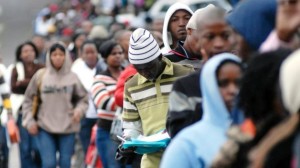 Here is what I wrote six years ago after South Africa’s ruling ANC dumped Thabo Mbeki in favor of Jacob Zuma as party leader, thereby ensuring an ignominious end to Mbeki’s tenure as the country’s second democratically elected president:
Here is what I wrote six years ago after South Africa’s ruling ANC dumped Thabo Mbeki in favor of Jacob Zuma as party leader, thereby ensuring an ignominious end to Mbeki’s tenure as the country’s second democratically elected president:
It’s an insult to Mbeki’s distinguished career of public service that he’s being so unceremoniously upstaged today by the man he fired as deputy president in 2005, after South African prosecutors made it clear that Zuma faced imminent arrest – not only for financial corruption but also for rape.
Alas, despite his legal woes, the only people who seem to regard Zuma as a hopelessly compromised leader are South African elites and any non-South African with half a brain. In fact, after Zuma got off on rape last year, I was so certain it would come to this that I expressed my despairing hope for this country as follows:
‘Let’s hope the judge assigned to render the verdict in Zuma’s trial for corruption is more judicial than paternal… Because, with so much evidence arrayed against him, if he’s acquitted of corruption as well, Zuma – who is arguably a morally-bankrupt rapist and thief – will become South Africa’s next president in 2009.’
(“Mbeki vs. Zuma for ANC Leadership,” December 17, 2007)
Alas, Zuma got off on corruption too, and was duly elected president in 2009. But it was hardly surprising that his leadership inspired such unscrupulous political behavior that no less a person than Nobel laureate (for literature) and celebrated anti-apartheid activist Nadine Gordimer felt compelled to publicly condemn it:
The original values of the ANC are being betrayed in many areas of our social life and our political life… I maintain the right to criticize my own party. I feel it’s a duty that we who are in the ANC must say what we think when the ANC does wrong….
(HARDtalk, BBC, May 10, 2011)
The problem is that far too few prominent Black South Africans share Gordimer’s sense of duty. The notable exception, of course, is Gordimer’s fellow Nobel laureate (for peace) Archbishop Desmond Tutu – who pleaded, indeed prayed, to no avail for ANC members to reject Zuma:
They should please not choose someone of whom most of us would be ashamed. Our country deserves better… What is happening in the ANC?
(BBC, December 15, 2007)
 This is why I was so heartened yesterday to read that Vusi Pikoli is now echoing Gordimer and Tutu’s lament. Pikoli is the former national director of public prosecutions who famously failed to convict Zuma of raping the daughter of a deceased ANC comrade, who lived in his home as a daughter.
This is why I was so heartened yesterday to read that Vusi Pikoli is now echoing Gordimer and Tutu’s lament. Pikoli is the former national director of public prosecutions who famously failed to convict Zuma of raping the daughter of a deceased ANC comrade, who lived in his home as a daughter.
Here’s how he is now condemning the ANC for failing to declare Zuma unfit to lead South Africa after his acquittal(s):
This was an illustration of the moral degeneration we face and I couldn’t understand why the ANC never charged the man internally for misconduct…
I was disgusted [especially with female members who not only cheered as Zuma demonized his ingenuous accuser as a provocative slut but actually helped him do it]. Somebody should stand up and say, ‘Not in our name;’ I am saying that now.
(South Africa Sunday Independent, October 20, 2013)
Of course, Tutu stood up and said just that. But I welcome Pikoli and hereby entreat others, especially among the growing ranks of Black South African oligarchs, to stand up and say of Zuma’s morally-bankrupt (and incompetent) leadership, “No more in our name.”
 I suspect, however, that “born-free” South Africans, whose aspirations are not restrained by abiding loyalty to the leaders who liberated the country, will rise up before prominent South Africans, whose sudden riches are depended upon that loyalty, stand up.
I suspect, however, that “born-free” South Africans, whose aspirations are not restrained by abiding loyalty to the leaders who liberated the country, will rise up before prominent South Africans, whose sudden riches are depended upon that loyalty, stand up.
After all, young South Africans are becoming just as disaffected, frustrated, and alienated with Jacob Zuma as young Egyptians became with Hosni Mubarak. Not least because, for them, South Africa’s Black economic empowerment policies seem more about ANC cronyism than employment/business opportunities.
South Africa has the highest long-term youth unemployment rate among medium-income nations, with those between the ages of 15 and 24 accounting for 48.2% of those unemployed.
(South City Press, June 16, 2013)
Accordingly, I fear it’s only a matter of time before they engage in the types of civil unrest that characterized the Arab Spring. And, ironically, Mandela’s passing might serve as the catalyst for this second struggle for (economic) liberation.
In which case I would only hope against hope that their African Spring proves far more successful … and less bloody.
Related commentaries:
Mbeki vs. Zuma…